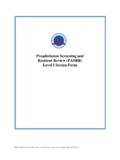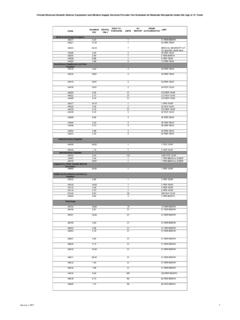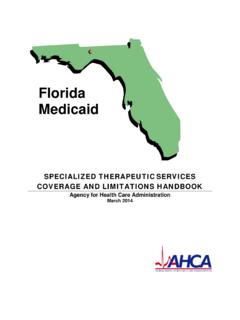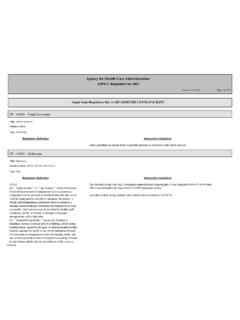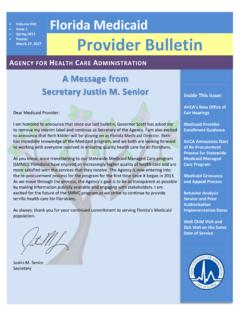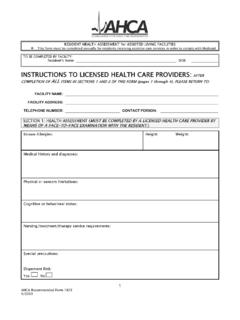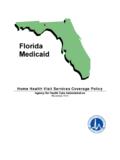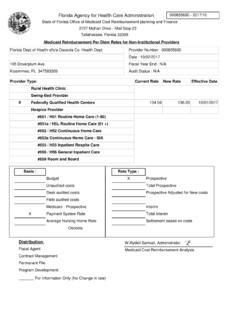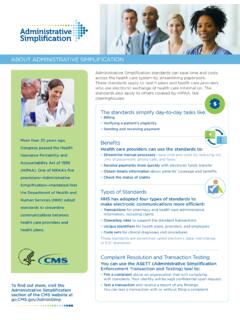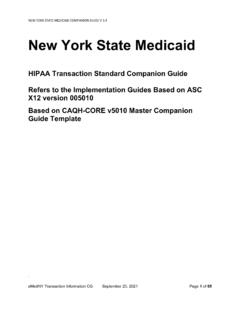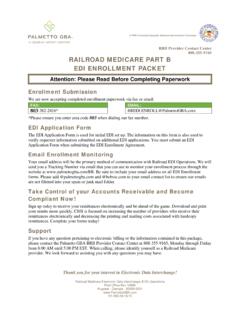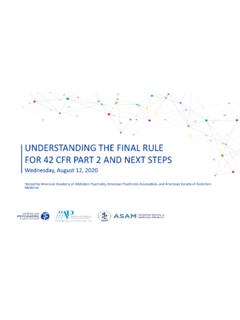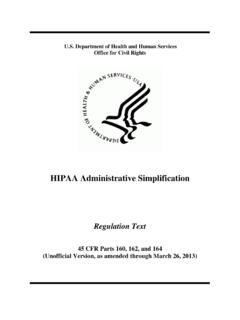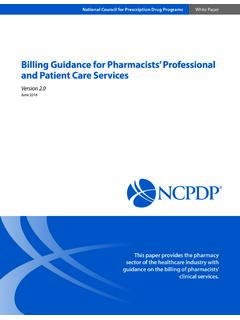Transcription of Florida Medicaid
1 Draft Rule General Medicaid Policy Agency for Health Care Administration _____ Florida Medicaid Florida Medicaid General Medicaid Policy Revised Date: Draft Rule i Table of Contents Introduction .. 1 Description .. 1 Definitions .. 1 General Provider Requirements .. 1 Eligibility Identification and Verification .. 1 Protecting Recipient Information .. 2 Right to Refuse Services .. 2 Solicitation (Patient Brokering) .. 2 Recipients or Providers that are Out of the Country .. 2 Out-of-State Services-Emergency .. 2 Out-of-State Services-Non-Emergency .. 2 Recipient Eligibility Information .. 3 Billing the Recipient .. 4 Billing for Missed Appointments .. 5 Billing for administrative Costs .. 5 Contributions to a Facility .. 5 Recipient Information .. 5 Who Can Receive .. 5 Freedom of Choice of Providers .. 5 Eligibility Determination .. 5 Inmates of a Public 6 Florida Medicaid General Medicaid Policy Revised Date: Draft Rule 1 Introduction Description This policy contains general requirements for providers and recipients regarding Florida Medicaid .
2 Florida Medicaid Policies This policy is intended for use by all providers that render services to eligible Florida Medicaid recipients, unless otherwise specified. For recipients enrolled in a managed care plan, providers should also refer to the recipient s managed care plan for any additional requirements. This policy must be used in conjunction with any applicable service-specific and claim reimbursement policies with which providers must comply. Note: Policies are available on the Florida Medicaid fiscal agent s Web site at All policies are incorporated by reference in Rule Division 59G, Florida administrative Code ( ). Definitions The following definitions are applicable to this policy. For additional definitions that are applicable to all sections of Rule Division 59G, , please refer to the Florida Medicaid definitions policy. Health Insurance Portability and Accountability Act Federal law that protects health insurance coverage for workers and their families when they change or lose their jobs (also known as HIPPA).
3 Additionally, administrative simplification provisions of HIPPA require the United States Department of Health and Human Services to establish national standards for electronic health care transactions and national identifiers for providers, health plans, and employers. Other provisions address the security and privacy of health data, including the HIPAA Privacy Rule, the HIPPA Security Rule; and the HIPPA Breach Notification Rule. These rules are in place to protect the privacy of an individual s health information; set national standards for the security of protected health information sent electronically; and to require notification following a breach of unsecured protected health information. Provider The term used to describe any entity, facility, person, or group that has been approved for enrollment or registered with Florida Medicaid . Recipient For the purpose of this coverage policy, the term used to describe an individual enrolled in Florida Medicaid (including managed care plan enrollees).
4 General Provider Requirements Eligibility Identification and Verification An eligible recipient must be enrolled in the Florida Medicaid program on the date of service and meet the criteria provided in the appropriate service-specific coverage policy. Recipients must provide proof of eligibility when obtaining Florida Medicaid services. Florida Medicaid issues an identification card (ID) to Florida Medicaid recipients; however, possession of an ID card does not constitute proof of eligibility. Provider(s) must verify each recipient s eligibility each time a service is rendered. Refusal of Services Providers may not refuse to provide a covered Florida Medicaid service to a recipient solely because the recipient s eligibility does not display in the Florida Medicaid Florida Medicaid General Medicaid Policy Revised Date: Draft Rule 2 Management Information System (FMMIS), if the recipient has proof of eligibility documented by DCF Form CF-ES 2014, with the Proof of Eligibility box checked.
5 Protecting Recipient Information Providers must comply with HIPPA. For the complete text of the HIPAA privacy rule, see Federal regulations in Title 42, Code of Federal Regulations (CFR), section 431, Parts F and G, allow exchange of Medicaid information with the following entities: Agencies that determine Florida Medicaid eligibility ( , DCF and the Social Security Administration, and agencies whose information is used to verify income and assets, such as the Internal Revenue Service). The Florida Department of Health, Vocational Rehabilitation, and Title V (Maternal and Child Health) grantees that are providing services or benefits to applicants and recipients. The information must be necessary for applicants and recipients to receive services or benefits. Health oversight agencies that survey certain institutions, such as nursing facilities, which provide services to applicants and recipients. Right to Refuse Services Providers may limit the number of Florida Medicaid recipients they serve, and accept or reject recipients in accordance with the policies of the facility or practice, except as follows: A hospital cannot refuse to provide emergency services in accordance with the 1986 federal Emergency Medical Treatment and Active Labor Act (EMTALA).
6 Providers cannot deny services to recipients based solely upon race, creed, color, national origin, disabling condition, or disability, in accordance with the federal anti-discrimination laws. Providers cannot deny services to a recipient due solely to the presence of third-party insurance coverage or the recipient s inability to pay a Florida Medicaid copayment or coinsurance amount. If the recipient is unable to pay at the time services are rendered, the provider may bill the recipient for the unpaid charge. Solicitation (Patient Brokering) Providers must not knowingly solicit, offer, pay, or receive remuneration, directly or indirectly, overtly or covertly, in cash or in kind: For referring an individual for the furnishing of or arranging for the furnishing of any service or item that may be paid for by Florida Medicaid . In return for obtaining, purchasing, leasing, ordering, or arranging for, or recommending any good(s), facility, item, or service(s) that may be paid for by Florida Medicaid .
7 Recipients or Providers that are Out of the Country Florida Medicaid does not reimburse for services provided to recipients when they are out of the United States ( ), or for services rendered by providers who are not in the Out-of-State Services-Emergency Florida Medicaid reimburses for emergency services provided out-of-state without a referral, or prior authorization, in the following circumstances: An emergency arising from an accident or illness that occurs while the recipient is out-of-state. The recipient s health will be endangered if the care and services are postponed until returning to Florida . Out-of-State Services-Non-Emergency Florida Medicaid reimburses for services performed out-of-state, in accordance with the service-specific coverage policy, when the following are met: Florida Medicaid General Medicaid Policy Revised Date: Draft Rule 3 The recipient has a referral from a physician for the service(s) There is not an available provider in Florida to perform the service(s) The service(s) are prior authorized by the Florida Medicaid Quality Improvement Organization (QIO) Florida Medicaid does not reimburse for services for recipients who are enrolled under the Title-IV-E Florida foster or adoption subsidy, when the child is living out of state.
8 Providers located in Alabama and Georgia are considered in-state providers, except for durable medical equipment providers that may be located no more than 50 miles from the Florida border. Recipient Eligibility Information Institutional Care Program Florida Medicaid Institutional Care Program (ICP) as defined in , , provides Medicaid assistance to pay for the cost of an eligible recipient s nursing facility care and general medical coverage, when determined by the Department of Elder Affairs (DOEA) Comprehensive Assessment and Review for Long-Term Care Services (CARES) to be in need of nursing facility services. Qualifying individuals must be enrolled with one of the following program codes: MI I, MI A, MI M, MI P, MI S. Eligibility for ICP must be approved prior to reimbursement under the Florida Medicaid program. Exception: Recipients in the Medicare Part A coinsurance period, Level of Care X, who are either enrolled in the MS benefit plan for the date(s) of service, or have QMB coverage (with or without other Florida Medicaid coverage) for the date(s) of service are not required to have ICP coverage.
9 The Department of Children and Families (DCF) provides a disposition notice to the facility and the recipient when ICP eligibility is approved. This form must be retained by the facility in the recipient s file. Institutional care program recipients are eligible for full Florida Medicaid medical coverage in addition to the Florida Medicaid services listed in the nursing facility, ICF/IID, and state mental hospital Florida Medicaid policies. Medically Needy Program Medically Needy program is for individuals who would be eligible for Florida Medicaid except for income or assets that exceed the limit for eligibility. If the household s income is greater than the income limit, the exceeding amount is determined as the share of cost. The individual is enrolled month-to-month but is not eligible for Medicaid until the share of cost is met by incurring medical bills that meet their share of cost. Providers may be reimbursed for authorized services if the recipient becomes Florida Medicaid eligible for that month.
10 Florida Medicaid does not reimburse for the following: Any services, until the share of cost is met each month Assistive care services HCBS waiver programs ICF/IID Nursing facility services Regional perinatal intensive care center services Services, until the share of cost is met each month State mental hospital services Statewide Inpatient Psychiatric Program services Florida Medicaid General Medicaid Policy Revised Date: Draft Rule 4 The recipient must submit proof of medical expenses to DCF, and DCF makes the eligibility determination. Eligibility is displayed in FMMIS for the date the recipient attains Florida Medicaid eligibility through the end of the month. For more information on an individual recipient s share of cost, contact the DCF service center. For more information on the Medically Needy program, visit Newborn Eligibility Unborn Child s Florida Medicaid Identification Number A pregnant recipient may obtain a Florida Medicaid Identification (ID) number and Florida Medicaid ID card (gold card) for her unborn child.

